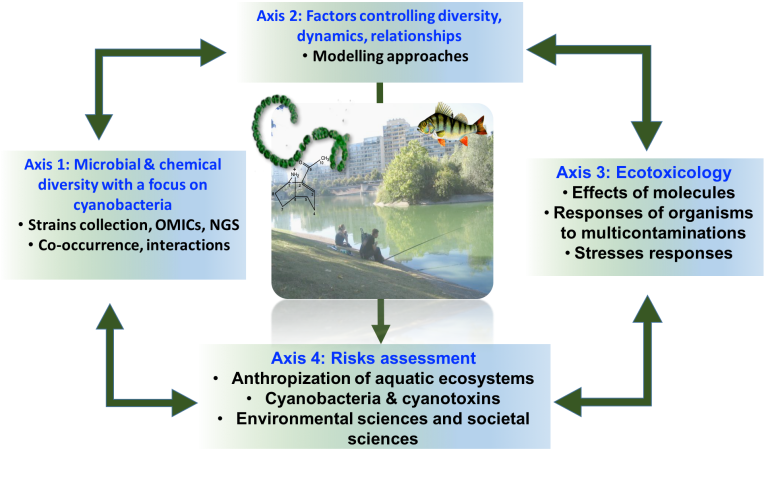The team Cyanobacteria, cyanotoxins and environment (CCE) investigates the ecotoxicology, microbial ecology and chemical ecology of continental aquatic ecosystems, with a special emphasis on diversity, functional role and ecotoxicological impacts of cyanobacteria.
Research at CCE attempts to answer two main questions:
- what are the environmental factors (biotic and abiotic) that control the diversity of cyanobacteria and of the metabolites they produce in continental aquatic ecosystems (causes) ?
- how do cyanobacteria affect aquatic ecosystem functioning (consequences) ?
To address these questions, approaches cover ecotoxicology, microbial ecology and chemical ecology, and are focused towards the study of a particular group: the cyanobacteria.
These questions are addressed through the following specific objectives :
- To revisit the microbial and chemical diversity of aquatic ecosystems with a focus on cyanobacteria and microalgae, and to understand the links between taxonomic diversity and the functioning of aquatic ecosystems, at different levels (e.g. microbial loop, between microorganisms and macroorganisms) and scales (space, time) through the use of controlled experiments (e.g. micro- and mesocosms) and using OMICs and NGS approaches (axis 1)
- To integrate knowledge obtained at various scales into modelling approaches that allow a better understanding of the interplay between cyanobacteria, other organisms, and the environment and have a predictive value (axis 2)
- To study the mechanisms that contribute to adaptation and acclimatization of cyanobacteria to environmental stressors thanks to our collection of strains isolated from various environments, to understand the responses of organisms and communities to multi-contaminations in the environment, and identify signatures of cyanobacteria-mediated ecotoxicological stress and toxins on them (axis 3)
- To better integrate scientific knowledge about proliferations of cyanobacteria into decision-making processes through transfer of knowledge to stakeholders, and development of interfaces between environmental and social sciences (axis 4)
Present and past team members cover a broad range of complementary disciplines and CCE has developed an extended national and international network of collaborations over time.

Schematic representation of the major CCE research topics (Biodiversity, ecotoxicology, and transfer of knowledge to environmental and societal sciences. The picture represents the close relationship between aquatic ecosystem (i.e. urban lake) and human pressures (i.e. fishing, urbanization). The ecological status of aquatic ecosystems has consequences on ecosystems biodiversity, ecosystem functioning and good & services of these environments (© C. Bernard, MNHN).
Collaborations
iEES, MARBEC, ANSES, ENVA, ESPCI, IPGP, LIENS, Ecologie Microbienne Lyon, Institut Pasteur (Paris, Abidjan), I2BC (CEA), Naffiri Center & Univ. Makerré (Ouganda) …
Networks
GIS Cyano
Ecotoxicomics
GDR Aquatic toxicology
RFMF
Metabohub
Funds
Muséum National D’Histoire Naturelle
CNRS – INEE
LABEX BcDIV
CNRS EC2CO
ANR Programs: OSS-Cyano, PULSE, DZIANI, CYPHER
FFEM (french fund for the mondial environment): project WaSAf (http://humbert19.wixsite.com/wasaf)

|
Responsable |
||
|---|---|---|
| MARIE Benjamin | Researcher, CNRS | |
|
COMPOSITION |
||
| ALOUI Haietz | Administrator, MNHN | |
| BERNARD Cécile | Professor, MNHN | |
| BILLIALD Philippe | Professor, Univ. Paris Sud | |
| BOULY Jean-Pierre | Lecturer, Sorbonne Université | |
| CATHERINE Arnaud | Lecturer, in delegation | |
| DEMAY Justine | Researcher, Thermes Balaruc les Bains | |
|
Professor, MNHN |
||
|
Assistant Engineer, MNHN |
||
| HALARY Sébastien | Lecturer, MNHN | |
|
Researcher, CDI, MNHN |
||
|
Lecturer, Université Reims |
||
| MESLI Siham | Engineer, CDD, MNHN | |
|
Professor, Université Paris 7 |
||
| QUIQUAND Manon | Researcher, CDD, MNHN | |
|
Technical assistant, MNHN |
||
|
Engineer, MNHN |
||
|
DOCTORANTS ET POST-DOCTORANTS |
||
| FOUCAUL Pierre | PhD student | |
| ORGEAS-GOBIN Samuel | PhD student | |
| SEIJO-TOUCEDA Inés | PhD student | |

CPNF Chimie des produits naturels fongiques
Voir l'équipe de recherche "Chimie des produits naturels fongiques".

